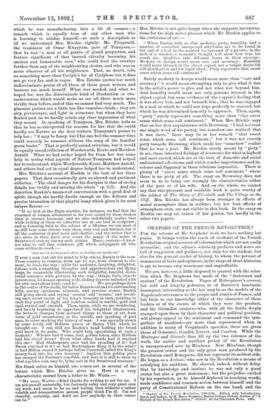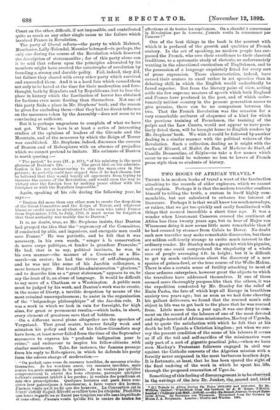ORATORS OF THE FRENCH REVOLUTION.* FOR the scheme of Mr.
Stephens' work we have nothing but praise. It brings within the reach of students of the French Revolution original sources of information which are not easily accessible; and the editor's scholarly prefaces and notes are full of suggestion and guidance, not only for the student, but also for the general reader of history, to whom the perusal of summaries of facts and opinions, in the shape of short histories, is apt to become very wearisome and unprofitable.
We are, however, a little disposed to quarrel with the selec- tion which Mr. Stephens has made of the "statesmen and orators" of the Revolution. Pages of Robespierre's correct, but cold and lengthy polemics, or of Barrere's bombastic harangues, interesting as the last may be as the models of the Napoleonic utterances to the people and armies of France, add but little to our knowledge either of the character of these leaders or of the events of which they were the product, and the Girondist orators—who, with all the faults deeply stamped upon them by their character and political position, will always appeal to the sentiment and command the sym- pathies of mankind—are more than represented when, in addition to many of Vergniaud's speeches, there are given those of Gensonne, Gandet, Louvet, and Cambon. While the Montagne and Gironde thus fill up the two volumes of the work, the earlier and worthier period of the Revolution is unrepresented save by Mirabeau. Now Mirabean, though the greatest orator and the only great man produced by the Revolution until Bonaparte, did not represent its noblest side. He began as a déclassé, who saw in the Revolution a means of satisfying his ambition. He showed, indeed, without delay, that by knowledge and instinct he was not only a great orator but also a great statesman ; but the prejudice excited by his reputation, as he himself deplored in touching words, made confidence and common action between himself and the party of Constitutional Reform on the one hand, and the
" Orators of the French lterolution, 1789-1796. Edited. with Introduction. Notes, and Indices, by H. Morse Stephens, Balliol College, Oxford, Author of "A History of the French Revolution." Oxford: At the Clarendon Press. 1892.
Court on the other, difficult, if not impossible, and contributed quite as much as any other single cause to the failure which involved France in Revolution.
The party of liberal reform—the party to which Malouet, Montlosier, Lally-Tolendal, Mounier belonged—is, perhaps, the only one during the course of the Revolution which deserved the description of statesmanlike ; for of this party alone can it be said that reform upon the principles advocated by its members might have averted the catastrophe of revolution by founding a strong and durable polity. Fail, indeed, they did, but failure they shared with every other party which survived and succeeded them. And it is a hard fate which caused them not only to be hated at the time for their moderation and fore- thought, both by Royalists and by Republicans, but to lose the place in history which the fascination of horror has obtained for factions even more fleeting than themselves. Not one of this party finds a place in Mr. Stephens' book, and the reason he gives for excluding them—that they had no direct influence on the measures taken by the Assembly—does not seem to us convincing or sufficient.
But it is perhaps ungracious to complain of what we have not got. What we have is at least a series of interesting studies of the opinions of leaders of the Gironde and the Mountain, and of the measures by which the Reign of Terror was established. Mr. Stephens, indeed, discusses the careers -of Danton and of Robespierre with an absence of prejudice which we cannot pretend to imitate. His estimate of Danton is worth quoting :—
"The period," he says (II., p. 161), "of his ministry is the most glorious of Da.nton's life The great blot on his adminis- tration is his not endeavouring to stop the mass icres in the prisons ; he probably could have stopped them if he had chosen, but he believed that they would terrify all opponents from trying to traverse the course of the Revolution, and would open the way to victory over the foreign foes by making peace either with the foreigner or with the Royalists impossible."
Again, speaking of his role during the following year, he say s :— " Danton did more than any other man to create the despotism -of the Great Committee and the Reign of Terror, and whatever blame or credit must be attributed to the men who ruled France from September, 1793, to July, 1794, it must never be forgotten that their authority was mainly due to Danton."
It is, no doubt, true, as Mr. Stephens insists, that Danton had grasped the idea that the "supremacy of the Committee,
if conducted by able, and ingenious, and energetic men could save France." He was patriotic, and he felt that it was necessary, in his own words, " songer e. la conservation -de notre corps politique, et fonder la grandeur Francaise." He had, that is to say, political instincts, he was, in his own manner—the manner of a Cromwell or a Bis- marck—an orator ; he had the virtue of self-abnegation, and he was not like some of his Jacobin colleagues, a mere human tiger. But to call his administration "glorious," and to describe him as a "great statesman," appears to us, to say the least of it, an abase of language. It would be difficult to say more of a Chatham or a Washington. A public man must be judged by his work, and Danton's work was to create, in the name of liberty, a terrible despotism by means of the most criminal unscrupulousness ; to assist in the organisation of the "brigandage philosophique " of the Jacobin rule. It was a work in which we look in vain for foresight, for high aims, for great or permanent results,—which lacks, in short, every eleinent of greatness save that of boldness.
.- -On a Alifferent moral plane altogether are the speeches of Tergniaud. That great orator, however fatally weak and
mistaken his policy and that of his fellow-Girondists may have been, at least never failed from the time of the September massacres to express his " profonde indignation pour le crime," and endeavour to inspire his fellow-citizens with similar sentiments. Take, for instance, the fanicmit passage irom his reply to Robespierre, in which he defends his party hem the odious charge of moderation :—
^, "On -parlait sans cease de mesures terribles, de mesures revolu- Peanaires. Je lea vondrais aussi, ces mesures terribies, mais eontre les,seuls ennemis de In patrie. 3e ne voulais p?..s q.u'elles compromissent Ia sarete des bons cit,oyens, parceque quelquett getqerats kuirtiient iiiterbt 1 lee perdre; je vonlais des punitions et nenwdes‘ pvbscriptiens. Quelques hommes .ont. pant faireCon- isterleur:.pntriotisme.out,nenter, 1 fake verser des larmes. fautij,,s.v n.qu,A ne rik qua des heureux. La Conyfftion et le 3i!tpl ado V_ Ltuque'i.a_MVent se ralliet■totafes citoyene Nutati quo lents regards no se fluent pas toujotrs sur elle sans inqnietude at sans effvoi. J'aurais vouln qu'elle fat le centre de toutes,lea affections et de toutes les esphances. On a cherche k consommer la Revolution par In terreur, fauras voulu la consommer par ramour !"
One of the best things in the book is the account with which it is prefaced of the growth and qualities of French oratory. In the art of speaking, no modern people has sur- passed the French, who owe their excellence to their classical traditions, to a systematic study of rhetoric, so unfortunately wanting in the educational curriculum of Englishmen, and to the possession of a language exquisitely fitted for every sort of prose expression. These characteristics, indeed, have caused their orators to excel rather in set speeches than in debating skill, in which the English would undoubtedly be found superior. But from the literary point of view, setting aside the few supreme masters of speech which both England and France have produced in the past, and of which unfor- tunately neither country in the present generation seems to give promise, there can be no comparison between the two. That the French Revolution was the occasion for a very remarkable outburst of eloquence of a kind for which the previous training of Frenchmen, the training of the pulpit and the Law Courts, would not appear to have pecu- liarly fitted them, will be brought home to English readers by Mr. Stephens' book. We wish it could be followed by another dealing in a similar manner with the political writers of the Revolution. Such a collection, dealing as it might with the works of Rivarol, of Mallet du Pan, of Ma.dame de Stud!, of Camille Desmoulins, of Sieyes—to take a few names which occur to us—would be welcome no less to lovers of French prose style than to students of history.







































 Previous page
Previous page